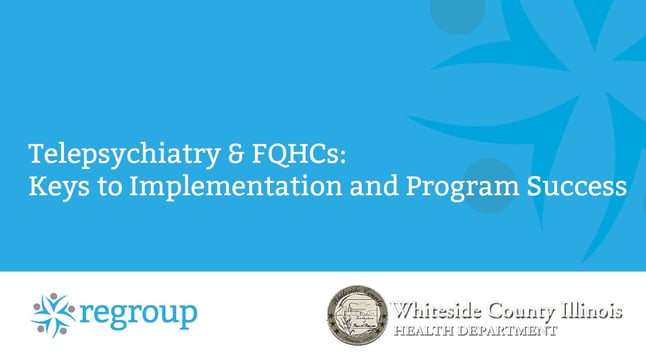Telemental Health for Federally Qualified Health Centers: Regroup and Whiteside County Health Department On-demand Webinar and Q&A
Whiteside County Community Health Clinic in rural Rock Falls, IL is a federally qualified health center that delivers a wide variety of services to over 13,000 patients per year. In our most recent webinar, Regroup was joined by Beth Fiorini, the county's public health administrator and CEO of the community health clinic and Whitney Miller, behavioral health coordinator for the county and clinic to discuss how they successfully implemented and continue to maintain an effective telepsychiatry program.
Download the on-demand webinar and read answers to some of the most pressing questions from our panel of experts.
Download the On-Demand Webinar
In what states and types of facilities can Regroup deliver behavioral health services?
Regroup can provide care in all 50 states. Regroup partners with a wide variety of healthcare organizations, including community health clinics, federally qualified health centers (FQHC), rural health clinics (RHC), primary care centers, multi-specialty groups, hospitals & health systems, American Indian communities/health and wellness centers and correctional facilities. Regroup has dedicated deployment, credentialing and recruiting teams who streamline the placement of our high-quality clinicians by managing the process and ensuring a clinician obtains a state license in a given state to begin delivering compliant care.
Does the onsite staff need to be savvy with technology? Does the organization need a large IT department to support a telepsychiatry initiative?
Whiteside found set-up and implementation very easy. They utilized one IT team member to complete initial set-up with the support of Regroup's technical implementation and support team. Following deployment, the onsite nurse supporting Dr. Epshteyn has been able to manage any technical issues, of which Whiteside has experienced few. Whiteside was even prepared for a power outage. Patients were still seen because of a battery backup system implemented during set-up.
How do you triage situations that are appropriate for telepsychiatry from those that are more safely and effectively addressed face-to-face?
For the vast majority of patients, telepsychiatry is the only option due to the challenges and barriers discussed during the webinar. There are really few patients where telepsychiatry is not a viable option, like those with severe autism, advanced dementia or those that have been diagnosed with psychotic tendencies. Patient preference should be taken into consideration when possible.
Almost all of Whiteside’s patients are referred to Dr. Epshteyn by one of their clinical therapists who are able to determine appropriate psychiatric services. Whiteside also has an onsite psychiatric nurse practitioner for patients who may benefit from a face-to-face encounter.
What are the licensure trends regarding providing telepsychiatry services across state lines?
Licensing varies from state to state. Improvements to expedite the process have been made as telehealth solutions have gained more and more traction. The Interstate Medical Licensure Compact, for example, was created to expedite the pathway to licensure for physicians who practice in multiple states by enhancing the ability of states to share investigative, disciplinary and other background information on the provider, meaning when they are approved to deliver care in one state, they are effectively approved to deliver care in other states within the compact. Currently, there are 29 states, the District of Columbia and the Territory of Guam that are a part of the Interstate Medical Licensure Compact.
A telepsychiatry partner with a dedicated licensing and credentialing department can help expedite state-specific processes to help with faster service delivery.
How do privacy regulations impact the location and manner of delivering telepsychiatry services? For example, are apps like FaceTime and Skype secure, and should providers allow a consumer to participate in sessions from a public setting?
Privacy and technology tend to be a point of concern when considering new modes of communication and care delivery, both for organizations and their patients. For Skype, it must be the business version with a specific Enterprise package to be officially HIPAA-compliant. Additionally, a Business Associate Agreement must be obtained from Microsoft prior to sending PHI. Skype must also be configured carefully. In order to be HIPAA-compliant, Skype must maintain an audit trail and all messages must be backed up securely and all communications saved. This can be complicated.
For a platform like FaceTime, a consumer-facing software, Apple does not sign Business Associate Agreements with healthcare entities, meaning FaceTime is not HIPAA-compliant, technically. FaceTime can be considered a "conduit" that doesn’t store data, in which case it doesn’t need to have full HIPAA protections in place.
While healthcare entities have been known to use both of these services, Regroup always recommends using a HIPAA-compliant platform to ensure the highest levels of security and communication between patients and providers. Telepsychiatry sessions should be held in private to closely mirror in-person sessions. Public spaces should not be used. Contact Regroup to discuss security protocols and it's proprietary HIPAA-compliant RegroupConnect platform.
Can Regroup provide services to inmates of a prison system?
Regroup currently partners with numerous correctional facilities and state Departments of Corrections to deliver care to those in need of behavioral healthcare while in corrections systems. You can learn more about Regroup’s perspective on safety and correctional telepsychiatry by reading our brief blog written by Dr. Hossam Mahmoud, Regroup’s Medical Director.
Do Regroup clinicians deliver care in blocks of hours or are they available on-demand?
Regroup’s integrated model of telepsychiatry is based on pre-scheduled blocks of time. Prior to deployment, Regroup works with every partner to determine the types of clinicians needed based on patient demographics, complexity and volume. During this discovery phase, Regroup and the facility establishes a block(s) of time that meet their criteria. The healthcare organization commits to this block of time with the Regroup upfront. This approach is advantageous for the healthcare facility, patients and the clinician delivering services and helps to closely mirror in-person care. Regroup clinicians will participate in patient engagement initiatives to minimize no-show rates and ensure the blocks of time are being utilized.
What is the average time a telepsychiatrist spends with a patient?
Session times vary depending on the type of service being delivered as well as the patient. There are typical industry standards for behavioral health treatment:
- 60 minutes for New Patient Diagnostic Evaluations
- 20 minutes for Adult Medication Management sessions
- 30 minutes for Child and Adolescent Medication Management sessions
These times are generally inclusive of preparation and charting.
How do the post-session surveys work for patients?
Post-session surveys through RegroupConnect can be completely customized. Regroup can provide a standardized set of questions that gauges a patient’s experience and satisfaction with their clinician as well as their overall satisfaction with telepsychiatry as a mode of receiving care. A healthcare organization may want to add site-specific questions to gain further insight into certain program elements or changes they may have implemented. Whether a facility decides to use a standard set of questions or customizes it to their liking, it always remains optional for the patient to complete. These surveys are not intended to track a patient's clinical progress over time.
The post-session survey appears after every patient encounter has ended. This means that a patient could provide feedback and comments multiple times if they felt that there was inconsistent quality being provided by the clinician from session to session.
Can Regroup provide Medication Assisted Treatment (MAT) services?
Regroup can currently provide MAT services in Illinois and Wisconsin. If an organization in any other state is considering providing tele-MAT, contact Regroup so we can better understand your situation and state's regulations around MAT via telehealth.
Can telepsychiatry be used for patients in their homes?
There are many factors that can impact an organization's ability and/or decision to provide telebehavioral healthcare to patients in their homes. First, consider the types of services and care required for your patient population. In many states, there are restrictions surrounding prescribing controlled substances to patients at home. This can be a barrier if your organization is hoping to provide psychiatry versus in-home therapy.
Secondly, reimbursement can dictate whether or not an organization wants to deliver in-home telebehavioral health services. Certain states do not reimburse for in-home services and require a patient to be at an approved originating site. These may include hospitals, community mental health centers, physician/practitioner offices, rural health clinics and federally qualified health centers.
Finally, technical support and implementation is a big consideration for organizations thinking about providing in-home care. In many instances, having a large volume of patients seeking or requiring care from home can put a large burden on your organization and its IT department as well as the telepsychiatry provider. Managing a small number of sites where telepsychiatry sessions are conducted is typically a more streamlined process compared to a telepsychiatry provider supporting dozens, or even hundreds, of patient homes.
How can a facility determine if they are prepared to implement/expand a telepsychiatry program?
When an organization feels like they may not be prepared to adopt telepsychiatry, an experienced partner can help assess their current structure, resources and gaps to understand what challenges may be encountered. Even small organizations with limited resources or knowledge of this model can be successful, especially when end-to-end support is included in the cost of services. For instance, Regroup has dedicated departments to support all phases of the process that has been tailored to fit the exact needs of site, including
- Recruiting
- Licensing and Credentialing
- Compliance and Regulatory
- Deployment
- Technical Implementation & Support
- Clinician Relations
- Account Management
To learn more about Regroup's model of telepsychiatry and how FQHCs can partner with Regroup to implement a cost-effective program, contact us today.
.png?width=170&height=100&name=Array_rgb%20(1).png)

